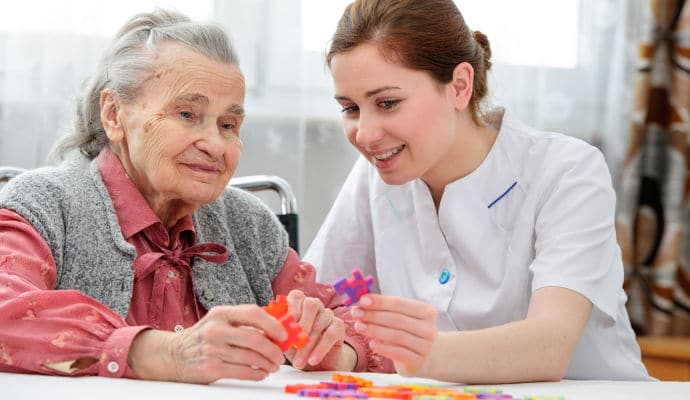Trusted Charlotte Memory Care: Specialist Support for Your Enjoyed Ones
Trusted Charlotte Memory Care: Specialist Support for Your Enjoyed Ones
Blog Article
What to Anticipate in Memory Care: An In-depth Guide to In-Home Provider
Navigating the landscape of memory take care of a loved one can be a complicated and mentally billed experience. As families involve terms with the difficulties of looking after somebody with memory loss, the world of in-home solutions uses a lifeline of assistance and specialized treatment. Understanding what to prepare for in memory treatment is vital for making sure the wellness of both the private with memory disability and their caregivers. From tailored daily tasks to safety methods and caretaker sources, this guide aims to clarify the thorough range of solutions available to those embarking on the journey of in-home memory treatment.
Daily Routines and activities
Taking part in structured daily activities and routines is an essential component of providing top quality treatment for people in memory care facilities. These activities are carefully designed to cater to the specific needs of residents with cognitive disabilities, such as Alzheimer's condition or dementia. Daily routines play a vital function in maintaining a feeling of familiarity, safety and security, and function for people in memory treatment.

Moreover, everyday regimens aid individuals in memory care facilities to really feel more focused and much less distressed. Uniformity in routines and activities can minimize confusion and anxiety, giving a feeling of security and convenience. Caregivers and team member play a vital function in promoting these tasks, making certain that each resident receives individualized and caring treatment customized to their one-of-a-kind preferences and abilities.
Specialized Care Provider
Within memory care centers, specialized treatment solutions are important to resolve the distinct demands and difficulties encountered by individuals with cognitive problems such as Alzheimer's disease or dementia. These solutions are created to give tailored assistance that provides to the specific needs of locals handling memory loss. Specialized care services in memory care centers commonly consist of individualized treatment plans, support with tasks of daily living, medicine administration, and behavioral therapies intended at enhancing high quality of life and lessening distress.
In addition, memory care facilities typically offer organized programs and tasks especially made to boost cognitive function and advertise social engagement amongst locals. These activities might include memory-enhancing workouts, sensory stimulation therapies, and reminiscence therapy sessions. In addition, specialized care services frequently include regular monitoring of locals' health and wellness and health by skilled team member who are geared up to take care of the one-of-a-kind challenges associated with cognitive decrease.
Security Steps and Setting
Applying strict safety measures and creating a safe environment are vital top priorities in memory care centers to guarantee the health and protection of homeowners with cognitive problems. Security in memory care begins with safe structure layout, consisting of secured doors and kept an eye on entries to protect against locals from straying outdoors unsupervised. By prioritizing safety and security procedures and preserving a secure environment, have a peek at these guys memory care facilities goal to offer a safety and encouraging setting for people with cognitive impairments.
Communication and Involvement Approaches
With a focus on improving and fostering significant communications lifestyle, reliable interaction strategies play a crucial function in supporting people in memory care centers. Interaction in memory care entails understanding the special demands of residents who may have cognitive disabilities like dementia. Simple language, clear go guidelines, and non-verbal signs such as motions and facial expressions are crucial devices for effective interaction. Caretakers must come close to locals with patience, respect, and empathy, developing an encouraging atmosphere where individuals feel understood and valued.
Involvement techniques are additionally vital in memory treatment, assisting residents stay energetic, stimulated, and connected to their environments. Tasks like songs therapy, art classes, reminiscence sessions, and sensory stimulation can stimulate memories, enhance mood, and advertise socializing. Tailoring activities to each person's interests and capacities is crucial to fostering involvement and a feeling of accomplishment. In addition, including acquainted items, photographs, and songs from the person's past can supply comfort and stimulate favorable memories. By focusing on customized interaction and involvement methods, memory treatment facilities can boost the overall health and high quality of life for their locals.
Caretaker Support and Resources
Offered the essential duty caretakers play in applying efficient interaction and involvement methods for residents in memory care facilities, providing appropriate assistance and resources is necessary to make certain the health of both the caregivers and the individuals under their care. Caregivers in memory care settings usually deal with special challenges that can influence their physical and psychological health. To deal with these difficulties, different support group and resources are offered to help caregivers in offering the most effective feasible treatment.
One crucial type of assistance is caretaker education and training programs. These programs gear up caregivers with the needed skills and knowledge to successfully take care of the signs and habits connected with memory loss. Additionally, support groups use caregivers the chance to connect with others that are experiencing comparable challenges, offering a sense of area and understanding.

Final Thought

Engaging in structured day-to-day tasks and routines is a fundamental element of giving quality care for people in memory care centers.Within memory treatment centers, specialized treatment services are crucial to attend to the unique needs and challenges dealt next page with by people with cognitive impairments such as Alzheimer's disease or mental deterioration. Specialized care services in memory care facilities often include customized care plans, help with tasks of day-to-day living, drug monitoring, and behavior treatments intended at boosting top quality of life and lessening distress.
Offered the critical role caregivers play in executing efficient communication and interaction methods for citizens in memory treatment facilities, offering sufficient support and sources is essential to ensure the well-being of both the caretakers and the people under their treatment. Daily activities, specialized care solutions, safety and security procedures, interaction techniques, and caregiver assistance are vital parts of in-home memory care.
Report this page